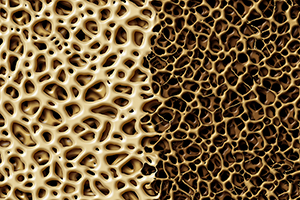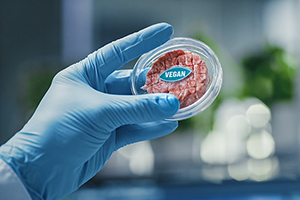



| By Dr. Ronald Hoffman
Grave’s disease is the most common form of hyperthyroidism (when the thyroid gland is overactive). When confronted with a diagnosis of Grave’s disease, there are four aspects that need to be addressed when planning a nutritional protocol: removal of thyroid toxic substances from the diet, focus on an immune supportive diet, dietary allergy elimination and nutritional supplementation.
Removal of thyroid toxic substances
Soy has been found to interfere with proper functioning of the thyroid gland by inhibiting thyroid peroxidase (TPO), catalyzed reactions essential to thyroid hormone synthesis. In one study, daidzein and genistein, two isoflavones found in soy, blocked TPO-catalyzed tyrosine iodination by acting as alternate substrates, yielding mono-, di- and triiodoisoflavones in the presence of an iodide ion. Inhibition of thyroid hormone synthesis can induce goiter (enlargement of the thyroid gland due to several factors—an iodine deficiency, malfunction of the gland or by overconsumption of a goitrogen).
Other foods that are considered goitrogens (a thyroid antagonist found in food) include plants of the genus Brassica (cabbage, turnips, kale, rutabaga, watercress, Brussels sprouts, cauliflower, broccoli and kohlrabi). These vegetables seem to be more of a concern for hypothyroidism (underactive thyroid). However, each case must be analyzed individually. Since Brassica vegetables block the uptake of iodine, there is a case in the scientific literature showing that this can have profound negative effects on a patient with Grave’s disease. Brassica plants are particularly goitrogenic in their raw state and therefore must be cooked. Consumption should be based on individual case analysis.
Immune support
The goal of a diet program for Grave’s disease is to remove all foods that may be triggering the body to create antibodies against parts of the thyroid and subsequently attack its own tissues. Researchers believe that certain foods that are new to humanity (grain products, dairy products, lentils and beans, and yeasted foods), which have only appeared in the past 40,000 years, are one of the possible causes of autoimmune ailments. Meats, nuts, vegetables and fruits have been eaten for more than 2 million years. Therefore, returning to a diet that is made of meat, nuts and produce may remove one of the main offending causes behind autoimmune problems. In essence, this is a Paleolithic diet.
In a Paleolithic diet, protein makes up about 25-30 percent of calories and is derived almost exclusively from lean meats and fish. This contrasts with the North American diet, which consists of only 10-15 percent protein and is derived from poor quality, high-fat meats, grains, dairy products and legumes. Thus both the amount and sources vary greatly between the two dietary practices. Proteins play a major role in autoimmune disease and thus these new sources of proteins (dairy, grains, legumes), which present the immune system with completely new protein fragments, are very problematic. Celiac disease is a fine example of a disease driven by specific proteins found in some grains.
Dietary allergy elimination
Some practitioners believe that an underlying mechanism of autoimmune diseases revolves around the identification and elimination of dietary allergies. Allergy researcher James Braly, M.D. believes that antibodies formed specifically against partially digested food particles form immune complexes when attached together and circulate in the bloodstream, eventually depositing in the tissues where they can cause inflammation, irritation and immune stimulation against the body’s own tissues.
Nutritional supplementation
Below is a list of some supplements that are utilized for hyperthyroidism.
Foundation Formula 1 tablet, twice daily
Acidophilus and Bifidobacteria as directed
EPA/DHA 3,000 mg and higher
L-carnitine 2 to 4 grams per day
Glutamine 2 grams, upon arising
GLA 300 2 capsules, with each meal
Flaxseed oil 2 tablespoons
Vitamin C Ester-C (500 mg), 3 times per day
Vitamin E 400 IU
Magnesium 400-800 mg (slow mag may be needed)
Other supplements may be required based on drug-induced nutrient depletion.
Case history
A 35-year-old woman diagnosed with Grave’s disease came in for an office visit. Her main symptoms included constant anxiety, bulging of the eyes, tachycardia, insomnia, diarrhea, gas, bloating and night sweats. Current medications included methimazole, Valium and a beta-blocker. A detailed diet history revealed a high intake of soy foods in the form of tofu, soy based meat analogues, soy protein shakes, soy milk, soy yogurt and soy nuts. Additionally, she would consume two cups of lightly steamed broccoli several times per week. The patient noted gas and bloating after ingesting any carbohydrates.
Her protocol consisted of eliminating thyroid toxic substances from the diet, adopting a Paleolithic diet, and practicing dietary allergy elimination and nutritional supplementation.
As part of a holistic protocol, stress reduction is paramount. The Stress Reduction and Relaxation Workbook by Martha Davis, Ph.D., Elizabeth Robbins Eshelman, M.S.W., and Matthew McKay, Ph.D., was recommended.
Within two weeks of adopting the aforementioned protocol, she notified the office that her follow-up with her endocrinologist resulted in substantial reduction in her goiter (2/3 of its original size). The patient also reported that her gas and bloating diminished and noted an increase in energy and attenuation of anxiety.
References:
Divi RL; Chang HC; Doerge DR, National Center for Toxicological Research, Jefferson, AR, Biochem Pharmacol 1997 Nov 15;54 (10):1087-96.
Fukuoka, Japan, Kuroda T; Okamura K; Sato K; Inokuchi K; Mizokami T;Fujishima M, Second Department of Internal Medicine, Faculty of Medicine, Kyushu University, Angiology 1996 Jul; 47 (7):709-12.
Valentino R; Savastano S; Tommaselli AP; Dorato M; Scarpitta MT; Gigante M; Micillo M; Paparo F; Petrone E; Lombardi G; Troncone R, Horm Res 1999; 51 (3):124-7.
Have a comment on this article? Send it.
Though we think of declining estrogen as the hallmark of menopause, it's actually common for…

Up to 12 percent of Americans have ulcers at some point in life. Peptic ulcers…
Gallbladder disease is a modern illness. An estimated 20 million Americans have gallbladder disease. The…

Lately, I’ve been sharing with Intelligent Medicine listeners that I’ve been augmenting my diet with…

Q: I am a 77-year-old woman. On recent bone density test, lumbar spine results range…

The 1973 sci-fi movie Soylent Green depicts a dystopian future in which over-population and environmental…

A New Era in Wellness: Non-CBD Innovations with Lex Pelger, Part 1

Our virtual voicemail is open 24/7, so there's no need to wait to submit your questions for Dr. Hoffman. Leave a message, and you may hear your question featured on the Intelligent Medicine radio program!